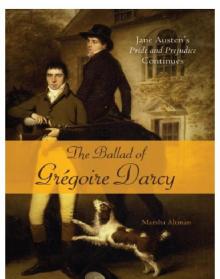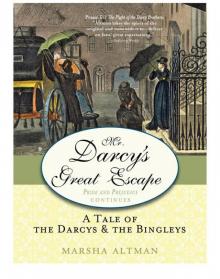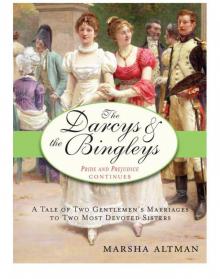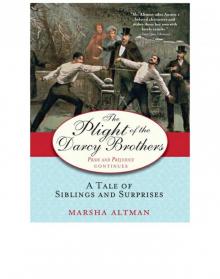- Home
- Marsha Altman
The Plight of the Darcy Brothers Page 6
The Plight of the Darcy Brothers Read online
Page 6
THE TRIP TO THE Continent—the physical landmass that was the continent of Europe—was mercifully short, with their arrival in Calais coming shortly before nightfall. Elizabeth was shocked to discover that the people on the other side of the Channel looked much the same as she did, at least in that major port town, and spoke English and were English—either stationed soldiers or English gentlemen fleeing their debts for the financial refuge Calais' laws offered.
“Did you expect them all to have green skin?” Darcy said, watching her face.
“No, we would have to be in Derbyshire for that.”
But this was not Derbyshire, or even London. It was Calais, a bustling but war-torn city. The streets and buildings were in disrepair, and even the best hotel was below Darcy's reasonable but meticulous standards.
It was terribly hard to procure a carriage to take them to Valognes, in Normandy. The roads were not clear, though the Darcys would have more to risk from the mud than from the French soldiers fighting counterrevolutionaries in the countryside. Darcy finally arranged for their travel. “We have to go west anyway. If the Hôtel des Capuchins is still under the same owner and has not been let, then there will be people I know there to aid us,” he said, and took her hand.
The trip to Normandy was uneventful. The roads were bad, but not at their worst (or so their driver said), and the land was quiet, its people exhausted by three decades of political and social turmoil. Elizabeth spent most of the trip watching the French countryside go by, while Darcy kept his head in a book of French phrases. “Don't worry, my dear. You will be quite sick of the countryside by the end of this and will not miss it one bit.”
“Perhaps our trip back will be more leisurely.”
“Perhaps.”
He had sent his card ahead, so there was some reception at the ancient manor that was now Hôtel des Capuchins. The stone building had once been a modest noble estate but had since fallen into a state of some disrepair. The man who greeted them was a soldier, probably a colonel, who seemed to be in his mid-thirties. “Mr. Darcy. And I assume, Mrs. Darcy.” He had a smile and a vaguely southern English accent. He was quickly joined by a modestly dressed woman with a young child at her side; there were bows and curtseys all around. “Mrs. Darcy, I am Colonel Audley, and this is my wife, Mrs. Audley, and my son, Robert.”
“Pleased to meet you all,” Elizabeth said.
“It is good to see you again, though our stay will be brief, as we have pressing business in the south,” Darcy said. “Is that old room where I used to stay still intact? The one that contained some family artifacts?”
“Of course, though I would say it's too small for you now,” the soldier said with a wink. “We have done some personal renovations, but not in that part of the house, and we would never throw anything out without inquiring first. I believe your father was here some years ago.”
“Yes I do recall he made a trip to France before he passed on.”
“I heard about that. My condolences, Mr. Darcy.”
“It is the way of things.”
They were welcomed in and found a quiet sort of charm about the wing that was in use. After the Darcys were served refreshments, Colonel Audley gave them a tour of the manor, pointing out many pictures and items he admitted being unable to identify, but that probably had belonged to the d'Arcy family. The Darcys were then released, shown suitable quarters, and told that dinner would be at six. The colonel's wife was French, from her accent, and spoke little to them.
Darcy went to the room he wanted to visit: a bedroom with a small bed, a desk, and a chest of drawers. He immediately sat down at the desk, opened its drawers, and began sifting through the contents.
“This is where you stayed?” Elizabeth said. With the lavish way Darcy lived at Pemberley, she could not imagine him living in such a cramped apartment. Clearly the d'Arcy family had come up in the world by moving to England and marrying into families there like the Fitzwilliams.
“Yes. At the time, Thomas—the Colonel—and I believe her is name is Arlette—were newly married, and he had been released from the army because of a nobly won wound. Because her family was here and he liked the country, he decided to settle down; the house was let by whatever local person had control of it. I was here only a short while. I believe my father would stay here sometimes on business. See, here are some papers of his.” He pulled a sheet out and lit the candle next to it. “Some letter about shipping prices to the senior Mr. Wickham.”
Left to her own devices, Elizabeth began opening the drawers. They were mainly filled with clothing, laundered but unused for some time. A layer of dust was in the room, but nothing too bad. The third drawer, however, was entirely different. “Darcy!”
He looked up from his papers and joined her. “Look at that.”
It was a vast collection of various personal artifacts, hastily stuffed into the drawer. She picked up one of the many small portraits. “Is this you? As a child?”
“It seems so. Not a very good likeness, though.”
“Yes, the nose is off. Or you've changed, perhaps.”
“Perhaps.” He scooped another one out. “I believe this is… Mrs. Isabella Wickham.”
“Did you know her?”
“No, but I've seen her in portrait. She died when I was too small to remember her.” He put it aside. “And Mr. Wickham. Our Mr. Wickham.” For it did look like George, but as a little boy. “Yes, definitely him.” He put it away with distaste.
“This one?” she said, holding up yet another, slightly larger one of a bejeweled woman.
“My mother.” He took that one out of the drawer and put it into the pocket of his waistcoat.
There were other things in the drawer, too, including a lot of jewelry. “Would you like it?” Darcy said to his wife.
“Oh, I have so much already,” Elizabeth said. “And I feel as though we are looting the place.”
“Hardly. These are my father's possessions, or a relative's. They don't belong to Colonel Audley, certainly.” He plucked one up that interested him, a gold bracelet with an inscription. “'To my darling Anne.'”
“For your mother.”
“Yes. Either he never had a chance to give it to her, or he took it around with him after she died and left it here for whatever reason.” This, he took out of the drawer and also put in his waistcoat. “If you see anything you like… I doubt we will be back here. We should take at least some if it.” He returned to the desk and opened up the drawer on the left, which was full of files and papers. He pulled one out at random. “Oh God.”
“What?”
“'My dearest'—I think this is a love letter my mother wrote to my father.” He stashed it away as if it was on fire and would burn him. Elizabeth laughed at the spectacle. “What? Would you like to read letters your father might have written while courting Mrs. Bennet?”
“No! What an awful idea!”
“Exactly.”
He returned to his scouring and she to the drawer. The items in it were all very lovely, but she could not imagine taking them, at least not the ones not clearly marked as belonging to his parents or relatives. She picked up the portrait of the young Darcy again and flipped it over. Upon closer inspection, she noticed a name scribbled hastily on the wooden back—and it was not Fitzwilliam Darcy.
She slipped it into the pocket of her coat without a word.
“Here it is,” her husband announced, startling her, but she hid her surprise as she turned around. “Some financial notations from a local bank where, according to the date, my father set up an account shortly before his death. It should still be there, and I should be the benefactor. If you wouldn't mind, I'll inquire with our hosts as to its precise location.”
“Since when did you become so money-hungry, Darcy?” “It is not that, and you know it. I am the financial head of the Darcy fortunes, and I should at least take the time to know where they are. It may be nothing, some charitable fund. But as long as we are here…” he trailed off as he pas
sed her, giving her a quick kiss.
Elizabeth had little understanding of the Darcy fortunes beyond what he had taught her that she would need to know upon his death. She had never studied economics, but she prided herself on having a keen sense of when her husband had some kind of scheme or plan running through his head that he did not want to share with her. Well, that was fine. She had one, too.
The bank turned out to be but a half hour's ride away, giving them enough time to be back for dinner, if their inquiries took a reasonable amount of time, and Darcy was fairly sure that they would.
The bank itself was an old, crumbling building but very much still in service and full of guards like any proper bank that had survived the Revolution. Unfortunately, as he had warned on the way, Darcy had to leave Elizabeth at the door to the office of the bank manager, because they were to discuss an account to which she had no rights. So she walked around a bit outside, admiring the wonderful fountain in the center of town, while Darcy was called into a stuffy office where an exceptionally fat man was struggling to seat himself behind his desk.
The bovine banker before him put on his reading glasses, looked briefly at the note, and then finally turned to his visitor. “So you are here to inquire about the account of Geoffrey Darcy. May I assume you are the executor of his estate?”
“I am his son, and yes, I am.”
The banker squinted at the records before him again. “Fitzwilliam Darcy.”
“Yes. Do you require proof of my identity?”
“No, Mr. Darcy, I do not, unless you wish to alter the nature of the account. Which, according to Geoffrey Darcy's own specifications, only you may do, and in person.”
“I admit to not knowing his specifications. I was only recently informed that he had an account here. It is not in the record books in England.”
The banker grunted or possibly snorted. “Yes, well, if you wish to alter the arrangements, you may do so, but I must require the proper papers for that.”
“Arrangements?”
“Yes.” The banker glanced over the records again, which he shared with Darcy. “Three thousand pounds are sent to Mont Claire annually, drawing on a reserve of some fifty thousand.”
“Mont Claire?” Darcy did his best to hide his surprise at the staggering sum.
“Yes. It is, I believe, in the west.”
“The money goes to an estate?”
“No, it goes to a person. Grégoire Bellamont. As the account specifies, he is permitted to do as he pleases with it, with the exception of redepositing it in the same account. What I mean to say is, Monsieur Darcy would not allow him to refuse it.”
Darcy was trying to stay focused on the bizarre information being thrown at him. “I am not familiar with this man. Have you met him?”
“No, Monsieur. The account was set up in the presence only of your father and a Mademoiselle Bellamont.”
Now with the blood rushing to his head and the pounding in his ears, Darcy could barely manage his last question, “And the date of that event?”
The banker squinted again. “February 7, 1797. Do you have any—”
“I wish all of the records to be made available in copy form at once,” Darcy said, standing up. “I will return tomorrow for them. Thank you for your time.”
The banker nodded, and Darcy left, rejoining his wife, who was waiting for him on a bench. “Darcy? Are you all right?”
How would he explain this to her? How could he possibly— “I don't know. This has become complicated. Please, I'll explain back at the manor.”
The ride back was brief, and Elizabeth stroking his hair did nothing to relieve his frustration. In fact, it made him feel downright guilty. They retired to their own quarters, and he spelled out what he had heard at the banker's.
“1797,” Elizabeth said. “Your father died—”
“In November of 1797. He was ill for about a year before.”
“And you were at Cambridge?”
“No. I had graduated two years prior and…” But he had already done the calculations when he heard the sum granted and that a woman was involved. He just didn't want to hand those calculations over to Elizabeth. “… I had just spent a year traveling the Continent. I returned the previous fall.”
“To begin your formal training? I mean, to be master of Pemberley.”
“Yes.”
“You did not accompany him on this trip—to set up this account?”
“No. He made mention of the trip, but to be perfectly honest, I have little recollection of it. It was brief, and I was busy with other things. I think Bingley was up from University and had come in for the shooting season. So—I took no notice, and my father did not talk much about it when he got back.”
Elizabeth paced in front of him, which terrified him, because he knew she would reach the same conclusions he had if she tried hard enough, which she would. “So a year or so after your return from your year abroad, some of which you spent here—”
“—A small amount, at the beginning—”
“—Your father goes to France and sets up an extremely generous account with an anonymous woman for someone who is obviously her son.”
He could not bring himself to answer her. His silence said everything anyway, and he could see the anger rising in her eyes.
“You think it's yours,” she said with such a lack of emotion that it was positively frightening.
“It is within the realm of possibility.”
“So you knew her?”
“The last name means nothing to me, but—”
“—That doesn't matter, does it? Do you even remember her first name?”
He softened his expression. “Elizabeth—”
She responded by slamming their bedroom door in his face.
“Elizabeth!” he shouted, pounding on the door. There was no noise from inside, other than the door soundly locking. “I—cannot further explain myself. And we have no confirmation! She could have been a family friend!”
Still nothing. Darcy knocked his forehead against the door. “Lizzy,” he said, in a whisper that he judged loud enough for her to hear. “I love you. Please.”
He almost fell forward as the door came open. Elizabeth's expression was of stone. “Then we will go to Mont Claire and get confirmation that there lives an old friend of your father who deserves a generous living.”
Then she shut the door again. This time, he did not have the strength to protest.
It was late in the evening when the messenger came to the Maddox townhouse, but this was no surprise. As both a doctor and a surgeon, Dr. Maddox was often called at all hours, as illness had no particular time schedule. His wife was quite used it and kissed him as he went off to work, as if he were doing so at a more proper time.
He did not tell her where he was going. His patient list was confidential, to the point of most of it being in his head. Before marrying Caroline, he had been practically destitute for years, with nothing but a shabby apartment and a collection of books he had managed to save from the people who came to collect everything that belonged to his profligate brother, and thereby, to him.
Maddox had saved many books by sneaking them out in the night. Those books were precious treasures that kept him company and were his only solace as his brother fled the country to avoid his debtors. Maddox had spent many hours reading by daylight when he worked a long night shift and spent the next day recovering. When the print on some of the pages began to blur, he had to shell out a small fortune—most of his savings—to get his glasses changed.
He took every job he had no major moral objection to, and that he was physically capable of, even the ones considered beneath proper doctors and assigned to surgeons. Surgeons, in his opinion, were not well trained, and doctors rarely put their training to use. He was also extremely discreet, partially from having no one to tell and partially from wanting the repeat business.
As a result, though his wife did not know it, he was one of the favorite people to call for ever
y madam and pimp in Town. He did not treat the women of easy virtue unless their maladies were something that could be mended, though he was very polite to them—as he felt a gentleman should be, whatever his profession—he could not cure their diseases because there were no cures that he knew of. Yet despite explaining this at length, and many times, he still found the women throwing rather risqué and grotesque descriptions of their symptoms at him, so that he probably knew what was wrong with every fancy lady in London.
On this particular evening, when he arrived, he was ushered along to a familiar room with a woman, barely covered by a silk robe, standing at the door.
“Hullo doc,” said the woman.
“Hello, Lilly,” he said.
“How's the good doctor these days?”
“Married,” he said quickly, and ducked into the appropriate room, which was not properly lit, but he knew his way around it. A man wearing trousers and an undershirt lay on the floor beside the bed, holding a cloth to his bloodied chest with one hand and a bottle with the other.
“I'm the doctor,” Dr. Maddox said very formally, kneeling beside his patient and setting down his bag. “Do you mind if I look at the wound?”
“Go ahead,” said the man, and removed the cloth. “There's been a lot of blood.”
Dr. Maddox removed his glasses and held up the lamp, peering in very closely. “The wound doesn't look deep. It was mainly done for dramatic effect, I imagine, but it's more of a surface wound. I'm going to probe it, if you don't mind. There may be some discomfort, and the instrument is a little cold, but it's more sanitary than my hands.”
“Goddamn it,” the man said, taking a swig from his bottle. “Goddamn whore.”
Dr. Maddox ignored this and opened the bag, carefully removing his instruments. The madam appeared at the doorway. “The usual water, please, in a clean bowl, and some towels.”
She nodded and disappeared. He turned his attentions to his patient. The wound was indeed mostly superficial, meant to draw blood (which had a fright factor) but not do serious harm. However, the initial blow, before Lilly had dragged the knife along his chest, was deeper, and the bleeding would not cease. The fact that the man was especially fat had given Lilly more room to work with.

 The Knights of Derbyshire
The Knights of Derbyshire Other Tales: Stories from The Ballad of Gregoire Darcy
Other Tales: Stories from The Ballad of Gregoire Darcy The Ballad of Gregoire Darcy
The Ballad of Gregoire Darcy Mr. Darcy's Great Escape
Mr. Darcy's Great Escape The Darcys and the Bingleys
The Darcys and the Bingleys The Plight of the Darcy Brothers
The Plight of the Darcy Brothers The Road to Pemberley
The Road to Pemberley